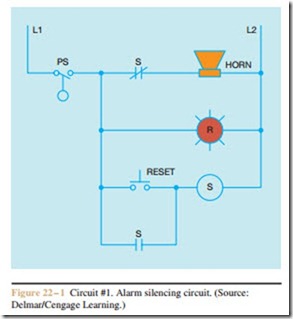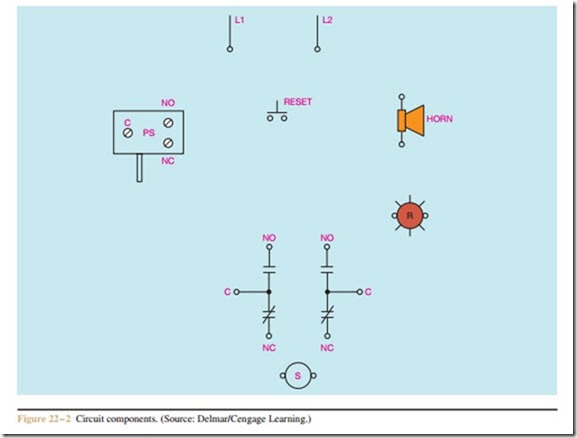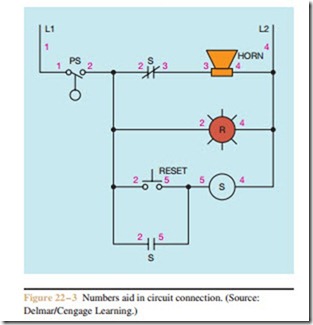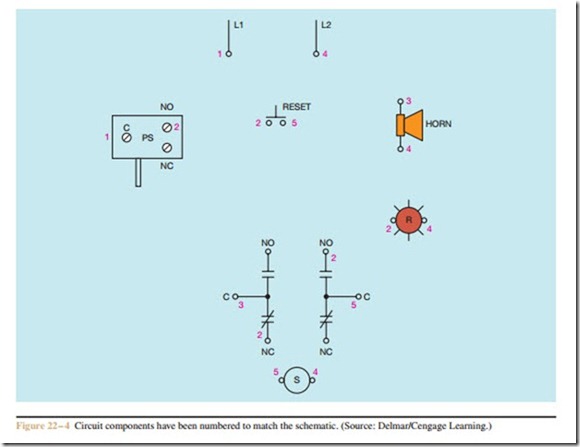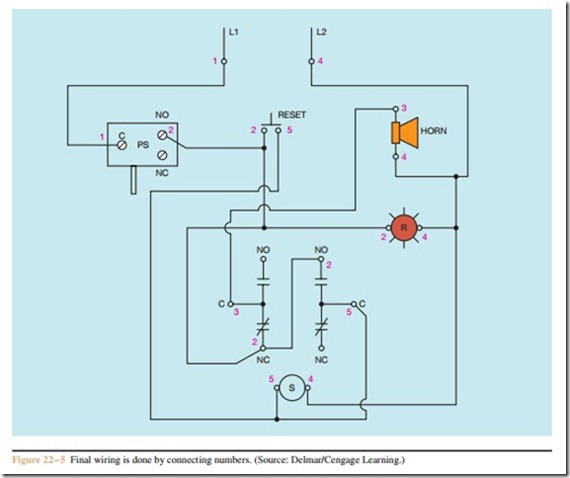DEVELOPING A WIRING DIAGRAM
Develop a wiring diagram from a schematic diagram. Connect a control circuit using a wiring circuit diagram.
Wiring diagrams will now be developed for the three circuits just discussed. The method used for developing wiring diagrams is the same as the method used for in- stalling new equipment. To illustrate this principle, the components of the system will be drawn on paper and connections will be made to the various contacts and coils. Using a little imagination, it will be possible to visualize actual relays and contacts mounted in a panel, and wires connecting the various components.
Figure 22 – 1 shows the schematic for the alarm silencing circuit from Chapter 19, and Figure 22 – 2 shows the components of the system. The connection of the circuit is more easily understood with the aid of a simple numbering system. The rules for this system are as follows:
A. Each time a component is crossed, the number must change.
B. Number all connected components with the same number.
C. Never use a number set more than once.
Figure 22 – 3 shows the schematic of the alarm silencing circuit with numbers placed beside each component. Notice that a 1 has been placed beside L1 and one side of the pressure switch. The pressure switch is a component. Therefore, the number must change when the pressure switch is crossed. The other side of the pressure switch is numbered with a 2. A 2 is also placed on one side of the normally closed S contact, one side of the red warning light, one side of the normally open RESET push button, and one side of the normally open S contact. All of these components are connected electrically; therefore, each has the same number.
When the normally closed S contact is crossed, the number is changed. The other side of the normally
closed S contact is now a 3, and one side of the horn is a
3. The other side of the horn is connected to L2. The other side of the red warning light and one side of relay coil S are also connected to L2. All of these points are labeled with a 4. The other side of the normally open RESET but- ton, the other side of the normally open S contact, and the other side of relay coil S are numbered with a 5.
The same numbers that are used to label the schematic in Figure 22 – 3 are used to label the components shown in Figure 22 – 4. L1 in the schematic is labeled with a 1; therefore, 1 is used to label L1 on the wiring di- agram in Figure 22 – 4. One side of the pressure switch in the schematic is labeled with a 1 and the other side is labeled with a 2. The pressure switch in the wiring diagram is shown with three terminals. One terminal is labeled C for common, one is labeled NO for normally open, and one is labeled NC for normally closed. This is a common contact arrangement used on many pi- lot devices and control relays (see Figure 5 – 2). In the schematic the pressure switch is connected as a normally open device; therefore, terminals C and
NO will be used.A1 is placed by terminal C anda2 is placed beside terminal NO. Notice that a 2 has also been placed beside one side of the normally open RESET button, one side of the normally closed contact located on relay S, one side of the normally open contact located on relay S, and one side of the red warning light. A 3 is placed beside the common terminal of relay contact S which is used to produce a normally closed contact, and beside one of the terminal connections of the horn. A 4 is placed beside L2, the other terminal of the horn, the other side of the red warning light, and one side of relay coil S.A5 is placed on the other side of relay coil S, the other side of the normally open RESET button, and on the common terminal of relay contact S, which is used as a normally open contact.
Notice that the numbers used to label the components of the wiring diagram are the same as the numbers used to label the components of the schematic. For instance, the pressure switch in the schematic is shown as being normally open and is labeled with a 1 and a 2. The pressure switch in the wiring diagram is labeled
with a 1 beside the common terminal and a 2 beside the NO terminal. The normally closed S contact in the schematic is labeled with a 2 and a 3. Relay S in the wiring diagram has a normally closed contact labeled with a 2 and a 3. The numbers used to label the components in the wiring diagram correspond to the numbers used to label the same components in the schematic.
After labeling the components in the wiring diagram with the proper numbers, it is simple to connect the circuit (Figure 22 – 5). Connection of the circuit is made by connecting like numbers. For example, all of the components labeled with a 1 are connected, all of those labeled with a 2 are connected, all of the 3s are connected, all of the 4s are connected, and all of the 5s are connected.
1. Why are numbers used when developing a wiring diagram from a schematic diagram?
2. The float switch in Figure 22 – 1 is:
a. Normally closed
b. Normally open
c. Normally closed held open
d. Normally open held closed
3. The circuit in Figure 22 – 1 is designed to sound an alarm if the liquid level rises to a high enough level. What change would have to be made in the circuit so that it would sound an alarm if the liquid level dropped below a certain point?
